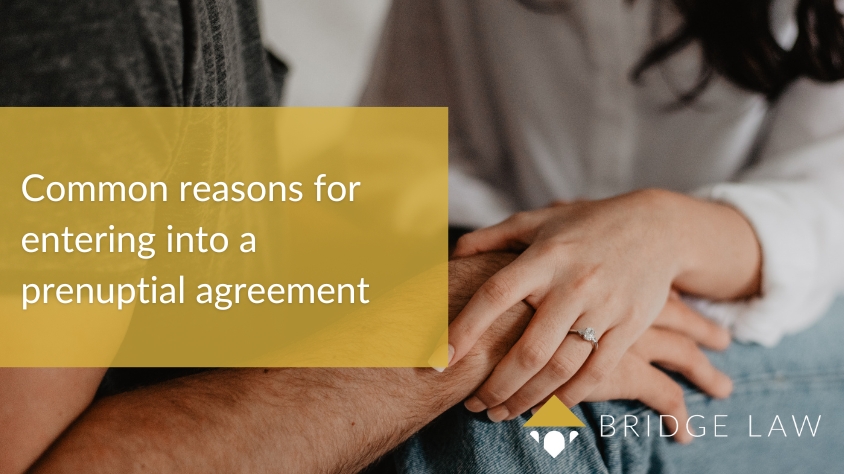Common reasons for entering into a prenuptial agreement

The number of people choosing to enter into Prenuptial Agreements (‘Prenups’) has steadily been increasing over the years for various reasons. In this blog, we’ve explained more about Prenuptial Agreements and discussed some of the common reasons why many couples, not just the rich and famous, opt to enter into a prenup before marriage.
It’s worth highlighting before we get into the ins and outs of Prenuptial Agreements, that there are a lot of misconceptions about what a Prenup is or who should enter into one. This is often due to how the media has portrayed prenups – many believe they are associated with only super-wealthy individuals and celebrities trying to protect their own wealth. However, the truth is, anyone can enter into a prenuptial agreement and may choose to do so for various reasons.
It is also commonly misconstrued that only pessimistic and unromantic couples enter into prenups. This is far from the truth, and in actual fact, the process of entering into a prenup can lead to couples feeling happier and more secure going into their marriage, as couples have to be open and honest and work together to enter into a mutual agreement with each other about their current and future financial situations and what would happen on the off-chance the relationship ends in future.
What is a prenuptial agreement?
In simple terms, a prenup is a legal agreement that couples can enter into before getting married, to outline financial responsibilities during the marriage and what they wish to happen to their assets (who gets what) in the event of a divorce in future. A prenup is a contract between a couple, which lasts for the duration of their marriage (usually subject to reviews periodically) and cannot be altered without both of them agreeing in writing. The equivalent to a prenup for couples entering into a Civil Partnership is called a ‘pre-registration agreement’.
It is also worth noting that couples who simply live together and do not marry or enter into a Civil Partnership can enter into an agreement over their finances in a similar way, in a Cohabitation Agreement. Also, some couples may not have a prenup but after marrying may decide that they wish to agree how their finances should be dealt with. In those circumstances, they may be able to enter into a post-nuptial agreement. This could, for example, be if one party inherits a significant amount or if they have children and one party takes a backstep in their career to care for the children.
The main purpose of a prenup is to clearly state how the couple’s assets will be divided in the possible event that the relationship breaks down and ends in divorce in the future.
One of the main benefits of putting a prenup in place is to give both parties peace of mind to know exactly what their financial situation will be when they enter into the marriage and what their situation would look like if they were to get divorced in future. This is because prenups typically cover all assets, debts and incomes of both parties.
There are various typical terms you can expect to discuss with the solicitor drawing up your prenup, to make sure your prenup covers all bases. This will include areas such as:
- How each party agrees assets will be split if they decide to get a divorce in future.
- How income and assets may be handled during the marriage.
- Protecting you from your partner’s individually acquired debt.
- Protecting individual inherited money, assets (including property) or savings that have been acquired prior to the marriage. (Some couples may also wish to protect assets they expect to gain or inherit during the course of the marriage too).
- If one party owns a business, protecting their ownership and control of the business
- Protecting assets or inheritance that the couple wish their children (possibly from a previous relationship) to acquire
It’s worth noting, a prenup, although a legal document, is not automatically a legally binding document. However, courts will consider a prenup during divorce proceedings as the intention of the parties and in most cases (as long as the prenup meets the qualifying criteria), uphold the agreement to enable the parties to divide assets how they had agreed to, allowing them to move forward with their lives quicker and with less stress than having to go through lengthy divorce negotiations.
Common reasons why couples enter into a Prenuptial Agreement
There are many reasons why couples choose to enter into a prenup, we’ve listed some of the common reasons we see below:
- Parties want to protect against losing part of their pension in a divorce settlement.
- Protect savings and assets built up before marriage where there is a large disparity in wealth.
- Protect expected future wealth where one party is predicted to gain through career progression or financial investments.
- Protect savings parties have acquired for others to inherit (commonly seen with older couples who are remarrying).
What happens if you don’t have a prenup in place and you get divorced in future?
Without a prenup in place, if a couple were to get divorced in future, assets would be divided up based on the current statutory criteria, which is set out in Section 25 of the Matrimonial Causes Act 1973.
Asset division in divorce, though, isn’t, despite common assumptions, as straightforward as a 50/50 split in all cases and can often lead to a long period of negotiating through solicitors to reach a settlement and in some cases, lead to contentious court cases, where it is at the court’s discretion, to order assets to be divided how they see to be most fair – taking into account all the individual circumstances of the case.
The main aim when splitting assets in a divorce without a prenup, however, is to divide assets based on what the court deems to be fair, dependent on factors such as the length of the marriage, if there are children etc. Judges have a fairly wide discretion, and decisions could be made that both parties are unhappy with. A lot of money can also be spent on legal fees sorting finances out if there is no agreement.
When should you enter into a Prenuptial Agreement?
A prenup should ideally be signed at least six months before your wedding, and it is common for terms to be added into your prenup that the agreement will be effective if the marriage occurs within 12 months of signing, to allow some leeway should your wedding get delayed.
The reason for signing a prenup so far in advance is that courts are reluctant to uphold an agreement that has been made close to the marriage or shows signs that one party did not fully understand what they entered into or were made to sign under duress. A court will also be unlikely to uphold a prenup if one party hasn’t sought out their own independent legal advice about the prenup.
The absolute minimum period a prenup should be signed before a wedding is 28 days before, but we do not advise leaving it this late, in this situation and if you have left it too late to enter into a prenup, a solicitor will recommend considering entering into a Post-Nuptial Agreement after the wedding instead.
We recommended to begin discussions about a prenup prior to planning your wedding or as early as possible into wedding planning, this can allow you to enjoy the build-up to your wedding without another task to do or any possible upset that may occur during the discussions – as understandably, deciding what may happen if your relationship does end, can be a difficult conversation to have – especially if done so whilst you are planning what you hope to be a long and happy marriage.
It is important to remember that discussing a prenup doesn’t mean you are planning an inevitable end to your marriage. It is to offer clarity and protection, ensuring each of you will be taken care of financially, in a way you both consider to be fair without unnecessary stress, delay or cost in the unfortunate eventuality that the marriage does come to an end.
If you would like further advice on prenuptial agreements, speak to our specialist family law team on 01484 442 700 (Holmfirth) or 0161 427 0084 (Marple Bridge). Alternatively, please email info@bridgelawsolicitors.co.uk.
Written by Carol-Anne Baker

